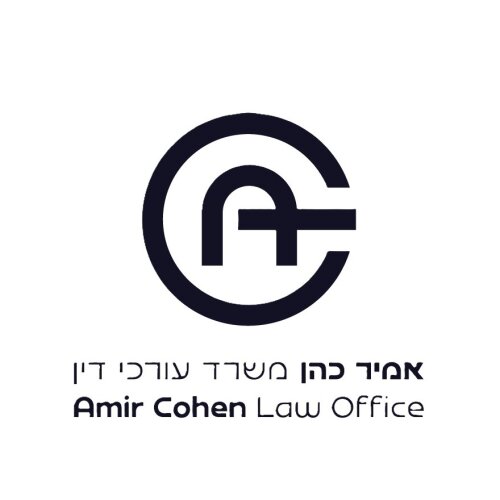Best Marriage Lawyers in Tel Aviv
Share your needs with us, get contacted by law firms.
Free. Takes 2 min.
Free Guide to Hiring a Family Lawyer
List of the best lawyers in Tel Aviv, Israel
About Marriage Law in Tel Aviv, Israel
Marriage in Tel Aviv, Israel operates under a unique legal framework based on religious laws and mandates. Israel does not have civil marriage or divorce; instead, marriages must be conducted according to religious customs. This means that Jewish marriages are overseen by Jewish law (Halacha), while other religious communities have their own traditional requirements. Understanding these laws is essential for anyone planning to marry in Tel Aviv, especially if it involves parties of different religions, civil unions, or same-sex marriages, which may require additional guidance.
Why You May Need a Lawyer
There are several scenarios where you might need the expertise of a lawyer when dealing with marriage matters in Tel Aviv, including:
- Interfaith Marriages: Legal complications can arise when people of different religions wish to marry.
- Same-Sex Marriages: Israeli law does not currently allow same-sex marriages, necessitating legal advice for alternative arrangements.
- Pre-Nuptial Agreements: Legal professionals can assist in crafting agreements to protect individuals’ assets and interests.
- Divorce: Given that divorce is also governed by religious law, which can be particularly complex, a lawyer's assistance is invaluable.
- International Marriages: Additional documentation and legal steps may be required for marriages involving non-Israeli citizens.
Local Laws Overview
Marriage laws in Tel Aviv, and Israel in general, have several key aspects:
- Religious Authority: Marriages are conducted exclusively by religious authorities pertinent to the individuals’ faiths.
- Interfaith and No Religion: Interfaith marriages and marriages between individuals with no religious affiliation may face restrictions.
- Registering Marriages: Marriages conducted abroad can be registered in Israel under specific conditions.
- Common-Law Partnerships: Common-law partnerships are recognized and offer some legal rights similar to marriage.
- Divorce: Divorces are handled by religious courts, which can complicate processes, particularly for different-faith marriages.
Frequently Asked Questions
1. Can I have a civil marriage in Tel Aviv?
No, Israel does not recognize civil marriages performed within the country. Couples often marry abroad to facilitate a civil marriage, which can then be registered in Israel.
2. Are same-sex marriages recognized in Tel Aviv?
While same-sex marriages are not performed in Israel, marriages conducted abroad are recognized. Legal advice is recommended for navigating the subsequent registration and rights.
3. Can interfaith couples marry in Tel Aviv?
Interfaith marriages cannot be conducted in Israel under current laws. Partners often marry abroad or convert religions, which may involve a complex legal process.
4. How can Jewish couples get married in Tel Aviv?
Jewish couples need to adhere to Halachic laws and marry through the Rabbinical court. They must provide documentation proving their Jewish status.
5. What’s needed to register a marriage performed abroad?
Couples must present their marriage certificate, identification, and supporting documents to the Ministry of the Interior. Consultation with a lawyer can help ensure compliance.
6. How do pre-nuptial agreements work in Tel Aviv?
Pre-nuptial agreements are increasingly common to protect assets and establish terms for potential separation. These require drafting and review by legal experts to ensure they’re enforceable.
7. What constitutes a common-law relationship?
A couple living together who present themselves as spouses may gain legal recognition as common-law partners, affording many marriage-like rights.
8. What are the challenges of divorce in Tel Aviv?
Divorce must be processed through religious courts, which can be complex and lengthy, particularly for non-Jewish or mixed-religion couples. Legal assistance is often necessary.
9. Are there legal protections for unmarried couples?
Common-law partnerships offer certain legal protections similar to marriage. It's advisable to consult a lawyer when navigating property and custody rights.
10. Can foreigners marry in Tel Aviv?
Foreigners may marry in Tel Aviv if they comply with the religious laws. However, it may often be simpler for foreigners to marry in their home countries or in other countries where civil ceremonies are permitted.
Additional Resources
Here are some useful resources and organizations for those seeking legal advice related to marriage in Tel Aviv:
- Ministry of the Interior: For marriage registration and documentation.
- Rabbinical Courts: For Jewish marriage and divorce matters.
- Family Courts: For civil issues related to family law.
- LGBTQ+ Organizations: Support and advice for same-sex couples.
- Legal Aid Bureaus: Provide assistance for those unable to afford private attorneys.
Next Steps
If you require legal assistance with marriage in Tel Aviv, consider taking the following steps:
- Identify Your Needs: Determine the specific legal questions or issues you have.
- Seek Recommendations: Ask for recommendations for experienced family law attorneys from trusted sources.
- Consult a Lawyer: Schedule a consultation to discuss your situation and get professional advice.
- Gather Documentation: Collect all necessary documents related to your marriage or legal situation.
- Follow Legal Counsel: Adhere to the advice and directions provided by your lawyer to ensure compliance with the relevant laws and procedures.
Lawzana helps you find the best lawyers and law firms in Tel Aviv through a curated and pre-screened list of qualified legal professionals. Our platform offers rankings and detailed profiles of attorneys and law firms, allowing you to compare based on practice areas, including Marriage, experience, and client feedback.
Each profile includes a description of the firm's areas of practice, client reviews, team members and partners, year of establishment, spoken languages, office locations, contact information, social media presence, and any published articles or resources. Most firms on our platform speak English and are experienced in both local and international legal matters.
Get a quote from top-rated law firms in Tel Aviv, Israel — quickly, securely, and without unnecessary hassle.
Disclaimer:
The information provided on this page is for general informational purposes only and does not constitute legal advice. While we strive to ensure the accuracy and relevance of the content, legal information may change over time, and interpretations of the law can vary. You should always consult with a qualified legal professional for advice specific to your situation.
We disclaim all liability for actions taken or not taken based on the content of this page. If you believe any information is incorrect or outdated, please contact us, and we will review and update it where appropriate.

















